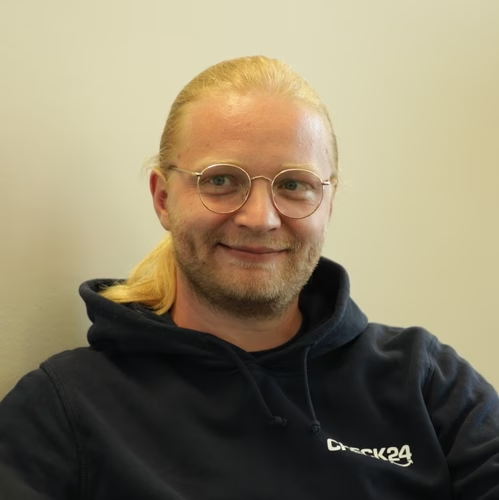
Christopher joined CHECK24 more than three years ago in Software Development and has since developed into a team leader. In this interview, he tells us more about his leadership style and reveals which characteristic is most important to him in new team members.
Before joining CHECK24, I worked as a chef and hosted banquets for up to 700 guests. Then, through coincidence, luck, and a particular preference for beautiful Excel spreadsheets, I ended up at an internet agency where I learned programming. The next stop was CHECK24 in Hamburg, where I started as a Software Developer three and a half years ago, and after nine months, I was promoted to senior and about six months later to team leader.
It's important to me that the whole team enjoys working together and getting a little better every day. My job is to give my colleagues as much support as possible and enable them to improve their day-to-day work. Good communication is the most important means of determining which individual needs exist and how these can be met best.
Does everyone feel they are doing meaningful work, actively contributing, and getting the correct recognition for this? Do all team members feel like they belong and have a good relationship with their colleagues? I aim to answer all these questions with "yes." However, how this translates into lived practice is entirely up to the individual. Everyone is different.
We use a wild mix. Our process is similar to Kanban: Our Product Managers know the technology very well and frame issues and stories so that they will take about a day's work. They also determine the priority of the tickets so that our Software Developers know which problems are more critical. This process works very well for us and even saves us estimation meetings and sprint planning.
For larger projects, we switch to scrum mode: our Software Developers estimate the complexity of the tickets, and together with our Product Managers, we identify possible showstoppers. For projects, we also achieve visible results for our customers in the shortest possible time horizons and split projects into two-week chunks.
Promoting young talents and career changers has become even more significant. Before my role as a manager, I received targeted support and could concentrate fully on my personal development. I really appreciated that back then, and that's what I also want to offer my team as a team leader. Learning how to do employee development correctly was a significant milestone for me. For the past two years, I've also been working a lot with career changers: you get to know people who can already look back on a successful career and have decided to take the courageous step of gaining a new foothold and diving into the IT industry. Clearly, programming still needs to be learned, but aside from that, these digital talents bring soft skills that are good for the IT industry. Whether they're painters, academics, restaurateurs, or executives with HR responsibility - these people have the fuel to become great Software Developers.

What is the most valuable thing you have learned at CHECK24?
Technology can only be as good as the people who drive these technologies forward every day with great ideas, extensive expertise, and splendid fun.
Christopher, Team Leader Software Development
I particularly like the practice of our guiding principle, "agile speedboats": we operate in many small teams that hardly depend on each other in everyday life - neither technically nor entrepreneurial. This allows the individual sections to play to their unique strengths and try out great ideas. As a result, CHECK24 is full of intelligent people who innovate daily and push paradigms that I didn't even know existed. In exchanges across many teams, I'm constantly making new discoveries that excite me.
If you knew how to use a pin printer in the 80s, you could get an excellent job in IT even back then, and you might have typeset and printed out large pieces of documentation from the mechanical engineering industry. It was optional to show qualifications or to come up with a prestigious degree. In the meantime, extensive industry and associated training and degree programs have emerged, and one quickly gets the impression that entry into the industry is only possible with such a qualification. In actual practice, IT is an industry that reinvents itself every year and offers a whole spectrum of entry-level opportunities for anyone who enjoys it. The high speed at which IT moves makes it easy to jump on the bandwagon and learn something few are familiar with.
Clearly, a great desire to explore the unknown together. We can expect a lot of programming languages, frameworks, and libraries with a volume of documentation that is impossible to plow through in a lifetime. In addition, we work with products that have existed on the market for many years and into which new ideas have always and constantly flowed and which have already undergone several paradigm shifts.
